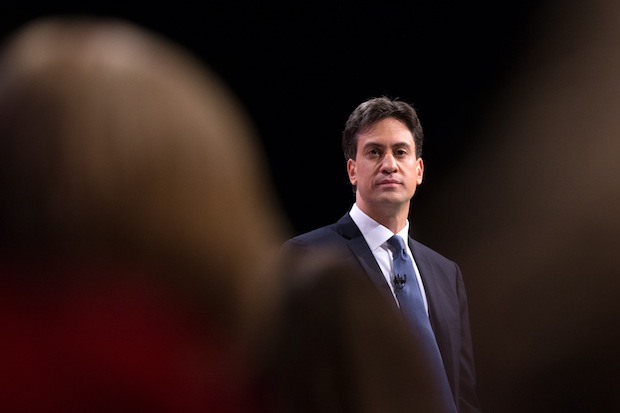Why does Ed Miliband think memorising a speech is more important than convincing voters that Labour really can be tough on the deficit? It wasn’t just his performance yesterday, in which the Labour leader failed to communicate key passages on the economy and immigration (James has them here), but the lack of candour from anyone on the stage about the scale of the challenge facing a Labour government if it came to power next year. Ed Balls said Labour was facing difficult, unpopular decisions, but then undermined his bad cop routine rather by announcing two relatively uncontroversial cuts.
On the Today programme Miliband tried to argue that his speech had still contained points on the economy, but that one of the ‘perils’ of memorising speeches was that you might leave bits out. This was odd, as it gave the impression that he didn’t think failing to talk about the issue that you trail behind the Tories on was a big deal. If dropping passages where you try to address your weakness is a ‘peril’ you’re prepared to risk, then perhaps you’re not quite as concerned by the deficit as you claim to be.
Of course, Miliband needed to use this broadcast interview to try to minimise the forgotten passages element of his speech (although the reporting before those omitted passages emerged was hardly complimentary: read Quentin Letts’ piece on the Labour leader’s spin doctors trying to drum up enthusiasm in the hall). But he managed to give the impression that he still thought his impressive feats of memory were more important.
Earlier on BBC Breakfast he came out with a rather curious line that no-notes speeches were part of the solution to anti-politics. He said:
‘You can have politicians reading out a speech, but I think you’ve got to change the way politics works. I think people want people to come along and tell them what they think, and that’s what I did yesterday. I’m sure I would do it differently. You know, if I did the speech again today I’d do it differently.’
This is interesting, because Ed clearly sees himself as some kind of political prophet of alienated voters, someone who understands them and speaks for them. But even his argument here shows why forgetting those passages was such a problem. If voters want a politician to tell them what he or she thinks, and that politician doesn’t think enough of an issue that comes in at number one for most of those voters, then how is the political prophet really speaking for those voters?







Comments